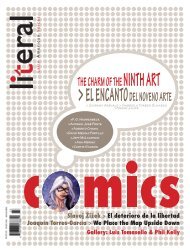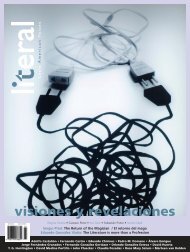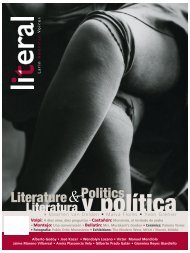Primo Jim Tanya Huntington Hyde - Literal
Primo Jim Tanya Huntington Hyde - Literal
Primo Jim Tanya Huntington Hyde - Literal
Create successful ePaper yourself
Turn your PDF publications into a flip-book with our unique Google optimized e-Paper software.
As soon as<br />
I felt it was<br />
possible to<br />
exist without<br />
smoking, I<br />
quickly lit up a<br />
cigarette. That<br />
was the fi rst<br />
of my<br />
next-to-lasts.<br />
into a post-op clinic in order to learn how to eat again<br />
and, above all, how to live without tobacco. Just when<br />
he’s about to give in to resignation, or as he puts it,<br />
to unbelievable despair, he looks out of the window in<br />
his room and sees some construction workers on their<br />
lunch break at a building site. He feels a rush of envy;<br />
after a few sentences, things get worse: “...at the end<br />
of their meal, I saw them take out packs, pouches, rolling<br />
paper, and light up their after-dinner smokes.” The<br />
scene saved him: he fi nally understood that being cured<br />
was worthwhile, because one day he’d be able to smoke<br />
again.<br />
Something similar happens to Hans Castorp, but it’s<br />
the other way round. When he arrives at the Berghof<br />
sanatorium, his waning health is somewhat reconstituted<br />
upon comparison with that of the other patients, particularly<br />
because he’s able to smoke: “I can’t understand<br />
it,” he says. “I’ve never been able to understand how<br />
someone can not smoke: it deprives man of the best in<br />
life...at least, of a fi rst-rate pleasure. When I awake in<br />
the morning, it makes me happy to know I’ll be able to<br />
smoke all day and, when I eat, I look forward to smoking<br />
afterwards; I could almost say that I only eat in order<br />
to be able to smoke... A day without tobacco would be<br />
empty, insipid and of little use... If I had to say to myself<br />
tomorrow: ‘No smoking today,’ I believe I wouldn’t have<br />
the courage to get out of bed... I’d stay put.” But as<br />
his stay on the mountain is drawn out, Castorp sees his<br />
pleasure fade away: smoking becomes more laborious<br />
to him; it leaves a bad taste in his mouth. And this obligatory<br />
abstinence is the sign that he’s come down with<br />
the spirit of the disease itself, that he’s now a member<br />
of its sect: “exhausted and nauseated, I threw the cigar<br />
as far away as possible.”<br />
Hopscotch ends with a cigarette. Oliveira asks for<br />
a light. Etienne remonstrates: “No smoking in the hospital.”<br />
But, “we are the makers of manners,” Oliveira<br />
responds, and then pronounces the last words of the<br />
novel: “Just let me fi nish my smoke.” Over 598 pages—in<br />
my edition—of the novel, surely La Maga and<br />
Oliveira smoke around 400 cigarettes between them,<br />
an anonymous brand at fi rst which is transformed into<br />
42 4 LITERAL. LATIN AMERICAN VOICES FALL, 2008<br />
Gauloise starting on page 155: “La Maga had lit up another<br />
Gauloise, and she was singing softly.” Cortazar’s<br />
“smokes”—unlike his jazz, or the turtleneck sweaters<br />
that are the uniforms of so many of his characters, or his<br />
eroticism restrained by the tutelage of love, or even of<br />
his almost earthly cats—are not mythical; they’re more<br />
like an inevitable condition: as if no act could take place<br />
without the corresponding smoke: “sitting on a pile of<br />
garbage, we smoked for awhile,” (this is the inaugural<br />
cigarette of Hopscotch); “...one left one’s wallet on the<br />
table, searched for one’s cigarettes, looked out at the<br />
street, and breathed in the smoke”; “against his face,<br />
he felt her cry with happiness that another cigarette had<br />
brought nighttime back to the room and the hotel”; “...<br />
Horacio oscillating rhythmically in tobacco... chatting up<br />
La Maga through the smoke and the jazz.”<br />
All these cigarettes prove nothing except the simple<br />
fact that, faithful to their nature, they are accumulated.<br />
“Now that I’m old,” Zeno writes in his diary, “and no<br />
one demands anything of me, I continue passing from<br />
cigarette to purpose, from purpose to cigarette.” In his<br />
story, disease possesses the resistance of conviction, and<br />
smoking is one of its essential symptoms. Zeno tries to<br />
cure himself, but along the way, he discovers that there’s<br />
a pleasure more powerful than his dream of health: that<br />
of the last cigarette. “I believe... it has a more intense<br />
fl avor. The last one gets its taste from the sense of victory<br />
over oneself, and the hope of a strong, healthy<br />
future close at hand.” Zeno smokes it throughout the<br />
book and only towards the end does he manage to free<br />
himself: “I’m cured!” Now all that remains is to die.<br />
Out of superstition and likelihood, I don’t call mine<br />
the last, but rather the next-to-last. Among other things,<br />
I can prolong the effect of certain decisions that way. For<br />
example, not long ago, on a Sunday around midnight, I<br />
repeated once again the solemn scene of stubbing out<br />
my cigarette and promising some scant divinity that as<br />
of the next day, I would no longer smoke. I sustained<br />
myself in a limbo of pristine air for 47 hours. As soon as<br />
I felt it was possible to exist without smoking, I quickly<br />
lit up a cigarette. That was the fi rst of my next-to-lasts.<br />
[2001]






